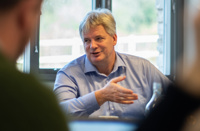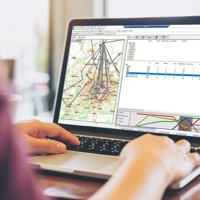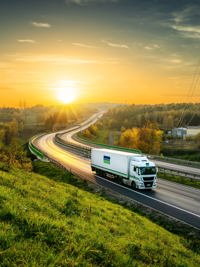One of Bunzl's strategic focuses is on continually maximising operating efficiency. A key focus is optimising deliveries across our network in order to reduce costs both for our customers and for ourselves. This has the additional benefit of reducing the carbon footprint associated with our deliveries. A number of initiatives throughout the Group support our continual optimisation, with a focus on new innovative ways to reduce our carbon footprint even further.
Bunzl has been focused on delivery consolidation for many years, but in recent years has seen an increasing benefit from this not just in terms of cost savings, but also carbon efficiencies achieved. The model relies on Bunzl businesses offering customers a one-stop-shop solution for all their ‘goods not for resale’, which in turn reduces the need for multiple deliveries from a number of different suppliers. Originally introduced as a way to give Bunzl a competitive advantage, consolidated deliveries have proved to be a vital tool in Bunzl reducing its emissions. Bunzl's sustainability credentials are increasingly strengthening our competitive advantage, with customers valuing our the ability to offer transparency over emissions data, as well as tangible solutions to mutually reduce emissions.

Sustainability is a core commitment for Bunzl and so it is important that we aim to reduce our carbon footprint from transportation.
Initiatives focused on reducing our carbon emissions from transport are coming onstream in Bunzl businesses in every region, ranging from the use of clever transport management systems, to route optimisation programmes, through to increased use of fuel efficient vehicles. Our consolidation model has also resulted in considerable decarbonisation.
Gijs Voskuilen
Head of Corporate Responsibility
Approximately 60-65% of Bunzl’s scope 1 and 2 carbon emissions worldwide come from its vehicle fleet. However, given Bunzl's focus on driving operational efficiency, coupled with its sustainability strategy - including a commitment to reduce its carbon emissions until achieving net zero by 2050 at the latest - we are constantly developing introducing a range of solutions to minimise emissions associated with deliveries and our vehicle fleet.
Further delivery efficiency gains and reductions in carbon emissions are being realised through the increasing use of more sophisticated transport management systems. For example, in the UK & Ireland, Bunzl Catering Supplies (BCS) has invested in an integrated system using Microlise and Ortec software. While in North America, our Distribution business has recently upgraded its route mapping software to a new platform which has improved route automation capabilities compared to the prior solution. The new platform fully automates daily routing to eliminate delivery miles, maximise product delivered on each truck, and optimise the number of trucks needed per day.
Our telematics software, Microlise, provides an in-cab interactive experience for our drivers. It informs them about their performance on the road, providing useful information such as the amount of emissions produced while idling or breaking hard. The system also monitors the health of the vehicle relating to engine torque, fuel use and battery health, effectively diagnosing vehicle performance. This information is then used in feedback sessions to guide drivers to a more sustainable and efficient driving style.
The Ortec software integrates with Microlise to offer a dynamic route planning system, providing drivers with information on the most efficient drop-off schedules and real-time feedback on such things as traffic accidents and site restrictions, often resulting in live re-routing of the delivery and more efficient use of trucks on a daily basis. This leads to a reduction in road miles and as a result carbon emissions.
James Matthews
Operations Director, Bunzl Catering & Hospitality Division in the UK & Ireland


In addition, Bunzl North America uses similar new technology to encourage more efficient driving habits and provide more effective and dynamic routing, scaled up to cover the whole of Bunzl North America’s operations. Its fleet efficiency programme introduces some other carbon reduction elements. For example, Bunzl North America schedules regular upgrades of its assets to more fuel efficient and aerodynamic trucks. In addition, Bunzl North America currently uses a climate change roadmap to track progress against specific sustainability goals, with vehicle emissions a substantial portion of the roadmap. This allows Bunzl North America to monitor and improve its environmental performance through the recording of fleet efficiency metrics and the numbers of new fuel-efficient vehicles being introduced to the fleet.
Bunzl Latin America is also increasing its use of electric vehicles. Bunzl EPI in Brazil is now using electric vans for deliveries in urban areas and hybrid trucks on longer journeys. Bunzl EPI has calculated a saving of 40 tons of carbon emissions in the first eight months of the project. Additionally, Danny, Talge and Volk do Brasil are working on increased collaboration and have launched the ‘Personal Protection Equipment Importers Division’ of Bunzl Brazil. The collaboration sees the individual businesses sharing transport solutions when transferring containers from ports to separate locations, thus significantly reducing road miles.
In Bunzl Continental Europe, King Belgium has introduced electric vehicles to its fleet. The vehicles emit no carbon and are charged using green energy. They are more suited for deliveries in city centres and drivers have commented on how the quiet and relaxing drive given by the electric vehicles offer a much more pleasant work experience.
Finally, in 2023 Bunzl Distribution Spain (BDS) was awarded the ‘Best Sustainability Business’ in the away from home, people, products and planet category at the Horeca Professional Expo. The award was presented to BDS because of its collaboration with Grupo Saona, a sustainability focused Spanish restaurant chain. Using its own proprietary carbon footprint tool, BDS managed to consolidate deliveries for Saona, resulting in a 60% reduction of small orders and a 10% reduction in total carbon emissions. BDS has also increased sales to Saona by 73% with an increase in deliveries of only 10%, thanks to the effectiveness of its sustainability tools.
These initiatives highlighted here are just some of the many ongoing daily improvements that Bunzl businesses have introduced to improve delivery efficiency and reduce delivery carbon emissions. This is the tip of the iceberg in Bunzl’s quest to decarbonise, with fresh initiatives to improve efficiency and reduce emissions from vehicles being introduced on a constant basis as new technologies and opportunities become available.

Implementing carbon efficiencies into our logistics is not only crucial for the planet, but it is also a strategic imperative for our business to remain competitive in a rapidly changing business landscape. The significance of the decarbonisation of our fleet cannot be underestimated and it is necessary to meet the expectations of increasingly aware customers who demand sustainable solutions.
Francisco Morcillo
Head of Sustainability, Bunzl Continental Europe